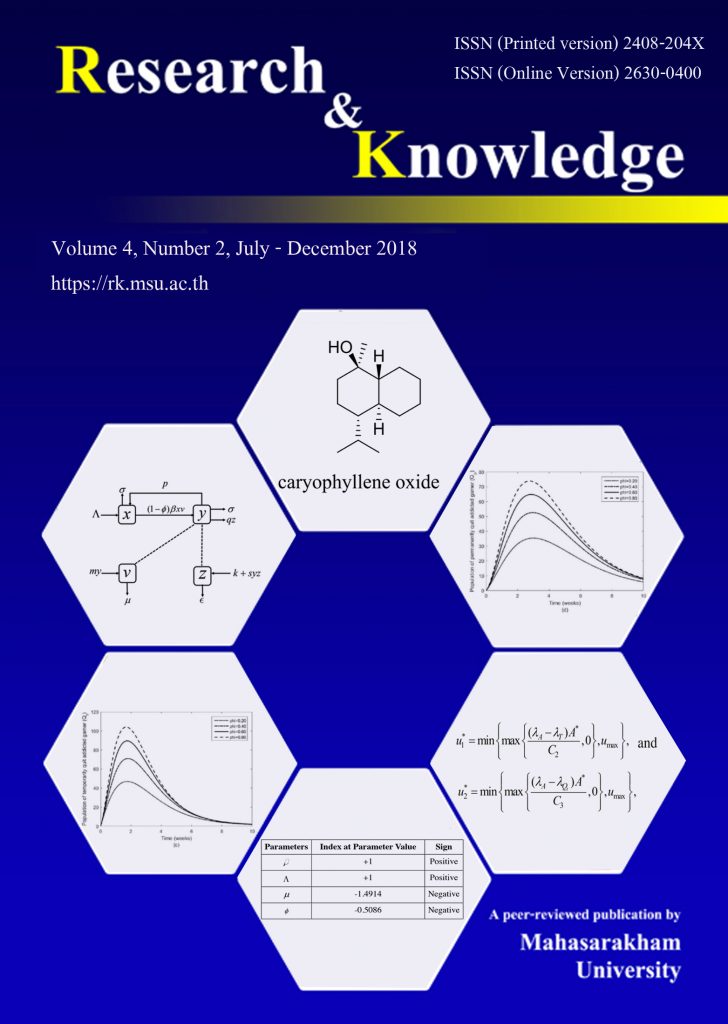The effects of online game addiction therapeutic camp on stability of online game addiction model for children and youth in Thailand
Keywords:
Online game addiction, therapeutic camp, numerical analysis, optimal controlAbstract
Online game addiction is one of the major issues that affects many aspects of child and youth development such as physical development, intelligence, meditation and violent behavior. Due to the fact that there is an increase in the number of addicted gamers every year, this research explored the effects of a therapeutic camp for children and youth who are addicted to online gaming and a support from family to heal, care and give attention to children more closely by constructing and analyzing mathematical model in the form of PATQ Qt p model. The model is studied theoretically and numerically. The basic reproduction number R0 and its sensitivity is calculated. Optimal control model is also constructed. A mathematical program is also used to explore the impact of some parameters on dynamics in specific cases. This is to find some approaches to control the epidemic or reduce number of addicted gamers in Thailand.
References
BBC News. 2006. Videogame addiction clinic opens. Retrieved September 4, 2017, from http://news.bbc. co.uk/2/hi/technology/5191678.stm.
Block, J. J. 2008. Issues for DSM-V: Internet addiction. American Journal of Psychiatry 165, 306-307.
Cao, H., Sun, Y., Wan, Y., Hao, J. and Tao, F. 2011. Problematic internet use in Chinese adolescents and its relation to psychosomatic symptoms and life satisfaction. BMC Public Health 11, 802.
Carli, V., Durkee, T., Wasserman, D., Hadlaczky, G., Despalins, R., Kramarz, E., Wasserman, C., Sarchiapone, M., Hoven, C. W., Brunner, R. and Kaess, M. 2013. The association between pathological internet use and comorbid psychopathology: a systematic review. Psychopathology 46(1), 1-13. doi: 10.1159/ 000337971.
Cynthia Sau Ting Wu., Ho Ting Wong., Kin Fai Yu., Ka Wing Fok., Sheung Man Yeung., Cheuk Ho Lam. and Ka Man Liu. 2016. Parenting approaches, family functionality, and internet addiction among Hong Kong adolescents. BMC Pediatrics 16, 130- 139.
Grant, J. E., Potenza, M. N., Weinstein, A. and Gorelick, D. A. 2010. Introduction to Behavior Addiction. American Journal of Drug Alcohol Abuse 36(5), 233-241.
Griffiths, M. D., Kuss, D. J. and King, D. L. 2012. Video game addiction: past, present and future. Current Psychiatry Reviews 8,308-318. Hur, M. H. 2006. Internet addiction in Korean teenagers. CyberPsychology & Behavior 9(5), 14-525.
Karapetsas, A.V., Karapetsas, V. A., Zygouris, N. X. and Fotis, A. I. 2014. Internet gaming addiction. Reasons, diagnosis, prevention and treatment. Encephalos 51, 10-14.
Jing Da Zhan and Hock Chuan Chan. 2012. Government regulation of online game addiction. Communications of the Association for Information Systems 30(13),187-198.
Lee, I., Yu, C. Y. and Lin, H. 2007. Leaving a never-ending game: quitting MMORPGs and online gaming addiction. DiGRA ‘07 - Proceedings of the 2007 DiGRA International Conference: Situated Play. 211-217.
National Statistical Office, Thailand. 2017. Retrieved September 4, 2017, from http://service.nso.go.th/nso/ web/statseries/statseries01.html
Ngoteya, F. N. and Gyekye, Y. N. 2015. Sensitivity analysis of parameters in a competition model. Applied and Computational Mathematics 4(5), 363-368.
Pontryagin, L. S., Boltyanskii, V. G, Gamkrelidze, R. V. and Mishchenko, E. F. 1986. The mathematical theory of optimal processes. Gordon and Breach Science publishers.
Pornnoppadol, C. 2013. Research analysis of game addiction situation in Thailand. Retrieved September 4, 2017, from http://www1.si.mahidol.ac.th/Healtygamer/download/academic/6413.
Salmon, J., Tremblay, M. S., Marshall, S. J. and Hume, C. 2011. Health risks, correlates, and interventions to reduce sedentary behavior in young people. American Journal of Preventive Medicine 41(2), 197-206.
Samsuzzoha, M. D., Singh, M. and Lucy, D. 2013. Uncertainty and sensitivity analysis of the basic reproduction number of a vaccinated epidemic model of influenza. Applied Mathematical Modelling 37, 903-915.
Sookpiam, M. and Viriyapong, R. 2018. Modeling the effects of education campaign on online game addiction of children and youth in Thailand. NU. International Journal of Science 15(1), 15-24.
van den Driessche, P. and Watmough, J. 2002. Reproductive numbers and sub-threshold endemic equilibria for compartment models of disease transmission. Mathematical Biosciences 180, 29-48.
Young, K. S. 2007. Cognitive behavior therapy with Internet addicts: treatment outcomes and implications. Cyberpsychol Behavior. Retrieved September 4, 2017, from https://www.ncbi.nlm.nih.gov/pubmed/17927535.
Zhan, J. D. and Chan, H. C. 2012. Government regulation of online game addiction. Communications of the Association for Information Systems 30(13), 187- 198.
Downloads
Published
How to Cite
Issue
Section
License

This work is licensed under a Creative Commons Attribution-NoDerivatives 4.0 International License.









